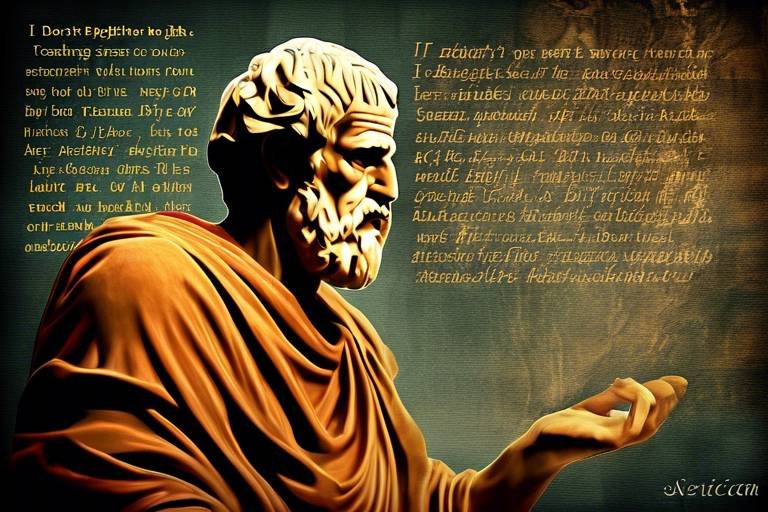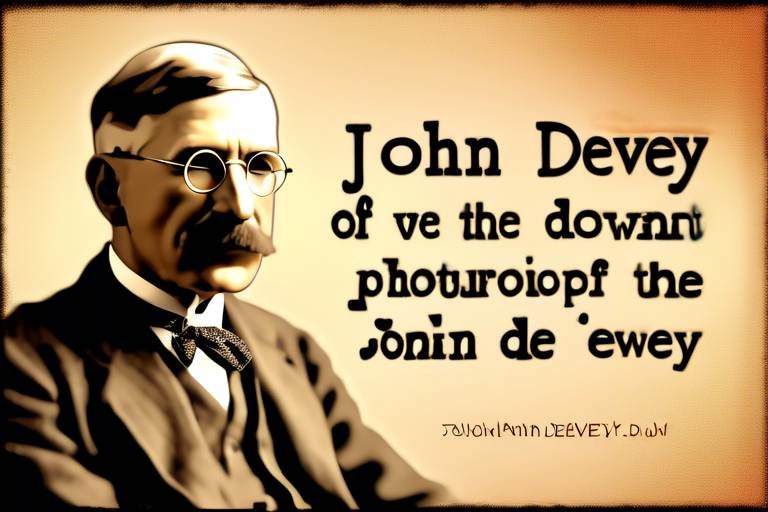A Reflective Dive into Martha Nussbaum's Philosophy
Martha Nussbaum is a name that resonates deeply within the realms of contemporary philosophy, ethics, and social justice. Her work has not only challenged conventional wisdom but has also opened new avenues for understanding human capabilities and the role of emotions in ethical decision-making. Nussbaum's contributions are like a breath of fresh air, invigorating the often-stale debates that surround moral philosophy. By weaving together insights from various disciplines, she invites us to reconsider what it means to live a good life, one that is rich in capabilities and grounded in empathy. In this article, we will explore the intricate tapestry of Nussbaum's thoughts, focusing on her **Capabilities Approach**, the significance of **emotions in ethics**, and her vision for **global justice**. Are you ready to dive into the profound depths of her philosophy? Let’s go!
Nussbaum's **Capabilities Approach** is a revolutionary framework that shifts our focus from mere economic indicators of well-being to the actual capabilities individuals possess to lead fulfilling lives. Imagine a world where the quality of life is measured not just by GDP but by the real opportunities available to people. This approach emphasizes that true social justice requires us to evaluate human development through the lens of what individuals can do and be. Nussbaum outlines ten central capabilities that she believes are essential for human flourishing, including the ability to live a life free from discrimination, to engage in play, and to experience emotions. By prioritizing these capabilities, we can create a more just society that recognizes the diverse needs and potential of every individual.
When we think about ethics, we often picture cold, hard logic and rationality. However, Nussbaum argues that this view is not only limiting but also fundamentally flawed. She posits that **emotions** are not just fleeting feelings; they are integral to our moral judgments and ethical frameworks. For instance, consider how empathy allows us to connect with the suffering of others. This connection can lead to profound moral insights that pure rationality might miss. Nussbaum challenges us to embrace our emotional lives, suggesting that they enrich our ethical understanding and promote deeper relationships. In her view, emotions are not the enemy of reason but rather its allies, guiding us toward compassion and justice.
Empathy is at the heart of Nussbaum's ethical framework. It acts as a bridge that connects us to the experiences of others, fostering a sense of shared humanity. When we truly empathize with someone, we step into their shoes, experiencing their joys and sorrows as if they were our own. This emotional engagement is crucial for promoting social justice, as it compels us to act against injustices that may not directly affect us. Nussbaum emphasizes that empathy can be transformative; it can inspire individuals to advocate for change and challenge systemic inequalities. By cultivating empathy in our daily lives, we not only enrich our own experiences but also contribute to a more just and compassionate society.
Nussbaum provides compelling examples of how empathy can lead to meaningful social change. Think about movements that have been sparked by empathetic engagement, such as those advocating for **civil rights** or **environmental justice**. These movements often begin with individuals who recognize the struggles of others and feel compelled to act. Nussbaum illustrates this point by referencing historical figures who have harnessed empathy to challenge the status quo. By understanding the pain and suffering of others, we can mobilize collective action that addresses systemic injustices and promotes societal well-being. In this way, empathy is not just a passive feeling but a catalyst for change.
Nussbaum's critique of traditional rationalist approaches to ethics is both bold and necessary. She argues that these frameworks often overlook the complexities of human experience, reducing moral reasoning to a set of abstract principles. By doing so, they fail to account for the rich tapestry of emotions that inform our decisions. Nussbaum urges us to recognize that ethical dilemmas are rarely black and white; they are often steeped in emotional nuance. This perspective invites us to embrace a more holistic approach to ethics, one that acknowledges the intertwined nature of reason and emotion in our moral lives.
Education plays a pivotal role in Nussbaum's vision for developing individual capabilities. She advocates for curricula that not only promote **critical thinking** and **creativity** but also prioritize **emotional intelligence**. Imagine a classroom where students learn to navigate their emotions, understand the perspectives of others, and engage in meaningful discussions about social justice. This approach not only prepares individuals for personal success but also equips them to contribute positively to society. By fostering these essential skills, we can cultivate a generation that is not only knowledgeable but also compassionate and socially responsible.
Nussbaum's philosophy extends beyond national borders, addressing global issues of inequality and injustice. She argues that we have a moral obligation to promote justice on an international scale, emphasizing our shared humanity. In her view, global citizenship is not just a lofty ideal but a practical necessity. We must recognize our interconnectedness and the impact of our actions on others, regardless of geographical boundaries. This perspective challenges us to think critically about our roles in a globalized world and to advocate for policies that prioritize human capabilities and well-being.
Nussbaum's call for **global citizenship** encourages individuals to embrace their responsibility towards others. It’s about recognizing that our lives are intertwined with those of people across the globe. When we acknowledge this interconnectedness, we foster a sense of solidarity that is essential for addressing global challenges. Whether it's climate change, poverty, or human rights violations, our collective action is crucial. Nussbaum inspires us to move beyond our immediate concerns and to think about the broader implications of our choices.
The implications of Nussbaum's work for policy-making are profound. She advocates for frameworks that prioritize human capabilities and well-being over mere economic growth. Imagine a world where policies are designed not just to boost GDP but to enhance the quality of life for all individuals. This shift in focus could lead to more equitable social policies that address the root causes of inequality. By integrating Nussbaum's insights into policy discussions, we can create a society that values human dignity and fosters opportunities for everyone to thrive.
- What is Martha Nussbaum's Capabilities Approach?
The Capabilities Approach emphasizes the importance of individual capabilities in assessing well-being and social justice, focusing on what individuals can do and be in their lives. - How does Nussbaum view the role of emotions in ethics?
Nussbaum argues that emotions are crucial in ethical decision-making, providing insights that pure rationality often overlooks. - Why is empathy important in Nussbaum's philosophy?
Empathy fosters understanding and compassion, allowing individuals to connect with others' experiences and promoting social justice. - What does Nussbaum mean by global citizenship?
Global citizenship involves recognizing our interconnectedness and responsibilities toward others, advocating for justice and equity on a global scale.

The Capabilities Approach
Martha Nussbaum's capabilities approach is a profound framework that reshapes our understanding of well-being and social justice. Unlike traditional economic measures, which often focus solely on income or wealth, this approach emphasizes the importance of individual capabilities—the real opportunities people have to achieve what they value in life. Imagine a world where we assess success not just by the GDP of a nation but by the actual lives people lead, their choices, and their ability to pursue happiness. This shift in perspective is revolutionary.
At the core of Nussbaum's philosophy is the belief that a truly just society must ensure that all individuals have the capabilities to live fulfilling lives. She identifies several essential capabilities that she argues should be universally recognized and protected. These include the ability to live a life free from violence, to express oneself, to engage in meaningful relationships, and to experience emotions. By focusing on these capabilities, we can better evaluate the well-being of individuals and communities.
Nussbaum's approach challenges us to consider questions like: What does it mean to be truly free? Are people able to pursue their own goals, or are they constrained by societal structures? To illustrate her points, Nussbaum often uses the example of education, arguing that it is not just about acquiring knowledge but about developing the full range of human capabilities. Education should be a tool that empowers individuals to think critically, engage creatively, and understand their emotions—essentially, a means to cultivate a well-rounded human being.
Moreover, Nussbaum's capabilities approach provides a robust framework for assessing social policies. It encourages policymakers to prioritize not just economic growth but the actual well-being of individuals. For instance, instead of merely focusing on increasing national income, governments should consider how their policies affect people's capabilities. This could involve investing in education, healthcare, and social services that enhance individual freedoms and opportunities.
In practice, implementing the capabilities approach can lead to significant societal changes. For example, when evaluating economic development projects, stakeholders might ask:
- How will this project enhance the capabilities of local communities?
- Will it provide opportunities for education and skill development?
- Does it respect the dignity and choices of individuals?
Ultimately, Nussbaum's capabilities approach is about recognizing our shared humanity and the diverse ways in which we can flourish. It invites us to look beyond superficial measures of success and consider what truly matters in the lives of individuals. By doing so, we can create a more just and compassionate society where everyone has the chance to thrive.

Emotions and Ethics
When we think about ethics, what often comes to mind? Logical reasoning, cold calculations, and a strict adherence to rules, right? Well, Martha Nussbaum shakes that notion up with her profound insights into the role of emotions in ethical decision-making. She argues that emotions are not just fleeting feelings; they are integral to our moral judgments and relationships. Imagine trying to navigate the complexities of human interactions without the guiding light of empathy, compassion, and even anger. It would be like sailing a ship without a compass, lost in the vast ocean of human experience.
Nussbaum challenges the traditional view that rationality is the cornerstone of ethical behavior. Instead, she posits that our feelings inform our moral compass, shaping how we perceive justice and injustice. For instance, when we witness suffering, our emotional response compels us to act. This is where Nussbaum's philosophy shines a light on the interconnectedness of emotions and ethics. She believes that emotions are not merely personal experiences but are deeply social and political, influencing how we interact with the world around us.
Empathy, in particular, is a cornerstone of Nussbaum's ethical framework. It's not just about feeling sorry for someone; it’s about truly understanding their experiences and emotions. This deep connection fosters compassion, allowing individuals to relate to others' struggles. When we empathize, we step outside of our own shoes and into the shoes of another, creating a bridge of understanding. This connection is essential for promoting social justice. Without empathy, how can we expect to advocate for those whose voices are marginalized?
Nussbaum illustrates the transformative power of empathy through real-world examples. Consider the impact of grassroots movements that arise from empathetic engagement. When individuals come together, driven by a shared understanding of suffering, they can challenge systemic injustices. For instance, social movements advocating for climate justice highlight how empathy can mobilize communities to address environmental degradation that disproportionately affects vulnerable populations. This is empathy in action, driving meaningful social change.
Moreover, Nussbaum critiques traditional rationalist approaches to ethics, arguing that they often overlook the complexities of human experience. Rationalism tends to simplify moral reasoning into a set of rules or principles, disregarding the rich tapestry of emotions that underlie our decisions. Nussbaum reminds us that our emotional responses are not weaknesses; they are strengths that enrich our moral landscapes. By acknowledging emotions, we can cultivate a more nuanced understanding of ethics that embraces the full spectrum of human experience.
In conclusion, Nussbaum's exploration of emotions and ethics invites us to reconsider how we approach moral reasoning. By recognizing the vital role of emotions, we can foster a more compassionate and just society. After all, ethics isn’t just about what we think; it’s about how we feel and how those feelings propel us to action.
- Why are emotions important in ethical decision-making?
Emotions provide a deeper understanding of human experiences and can motivate actions toward social justice. - How does empathy contribute to social justice?
Empathy fosters connections between individuals, promoting collective action against systemic injustices. - What are the critiques of traditional rationalist ethics?
Traditional rationalism often overlooks the complexities of emotions, simplifying moral reasoning and neglecting the richness of human experience. - Can emotions lead to better ethical outcomes?
Yes, by integrating emotions into ethical frameworks, we can develop a more comprehensive and compassionate approach to moral reasoning.

The Role of Empathy
Empathy is not just a buzzword in contemporary discourse; it's a fundamental pillar in Martha Nussbaum's ethical framework. She argues that empathy allows us to step into the shoes of others, understanding their feelings and experiences on a deeper level. Imagine walking through a bustling city, where each passerby has their own story, struggles, and triumphs. Empathy is that magical ability to connect with those stories, to feel the weight of their burdens, and to celebrate their victories as if they were our own. This connection is not merely sentimental; it has profound implications for how we navigate our moral landscape.
Nussbaum emphasizes that empathy fosters understanding and compassion, which are crucial for ethical decision-making. When we empathize with others, we are more likely to consider their needs and perspectives, leading to more just and equitable outcomes. This is particularly important in situations where vulnerable populations are involved. For instance, think about how societal issues like poverty, discrimination, and healthcare disparities can feel abstract until we view them through the lens of personal stories. By engaging our empathy, we can transform these abstract concepts into pressing moral imperatives that demand action.
Moreover, empathy can serve as a catalyst for social change. Nussbaum illustrates this by providing examples of how empathetic engagement can address systemic injustices. Consider the movement for racial equality. When individuals take the time to listen to the experiences of marginalized communities, they begin to understand the depth of the injustices faced. This understanding can lead to collective action, as empathy fuels the desire to not only recognize the problem but to actively participate in its resolution.
However, it's important to note that empathy is not without its challenges. Nussbaum critiques the notion that empathy can be a straightforward solution to ethical dilemmas. She acknowledges that while empathy can guide us, it can also lead to biases if we only empathize with those who are similar to us or those we find relatable. This is why she advocates for a broader understanding of empathy that encompasses all individuals, regardless of their background or circumstances. This inclusive approach encourages us to expand our emotional reach and to cultivate a sense of shared humanity.
In essence, the role of empathy in Nussbaum's philosophy is a call to action. It challenges us to look beyond ourselves and to engage with the world around us. By fostering empathy, we not only enrich our own lives but also contribute to a more compassionate and just society. So, the next time you encounter someone with a different story than your own, ask yourself: How can I connect with their experience? How can my empathy lead to meaningful change?
- What is the main idea behind Nussbaum's capabilities approach?
Nussbaum's capabilities approach focuses on the importance of individual capabilities in assessing well-being and social justice, moving beyond traditional economic measures. - How does empathy influence ethical decision-making?
Empathy plays a crucial role by allowing individuals to understand and consider the feelings and experiences of others, leading to more compassionate and informed moral judgments. - Why is global citizenship important in Nussbaum's philosophy?
Global citizenship emphasizes our interconnectedness and shared responsibility towards addressing inequalities and promoting justice on an international scale.

Empathy in Action
Empathy isn't just a warm and fuzzy feeling; it's a powerful catalyst for change. Martha Nussbaum illustrates how empathy can transform not only individual lives but also entire communities. When we genuinely connect with the feelings and experiences of others, we begin to understand their struggles, aspirations, and humanity. This emotional connection can fuel movements for social justice and inspire collective action against systemic injustices.
For instance, consider the impact of storytelling in social movements. When individuals share their personal narratives, they invite others to step into their shoes. This practice not only raises awareness about issues like poverty, discrimination, and violence but also fosters a sense of solidarity among diverse groups. Nussbaum argues that such empathetic engagement can lead to meaningful societal transformations. It's about recognizing that behind every statistic or policy, there are real people with real emotions.
Moreover, empathy can be a driving force in policy-making. When lawmakers and leaders approach issues with empathy, they are more likely to consider the needs and rights of marginalized communities. This can lead to more inclusive policies that prioritize human well-being over mere economic metrics. For example, policies addressing homelessness can be more effective when they are informed by the stories and experiences of those affected, rather than just data and numbers.
To illustrate this further, let’s look at some practical examples of empathy in action:
- Community Outreach Programs: Initiatives that encourage volunteers to engage with the homeless population not only provide immediate assistance but also foster understanding and compassion among participants.
- Advocacy Campaigns: Campaigns that share personal stories of individuals affected by systemic issues, such as racial inequality or climate change, can galvanize public support and drive legislative change.
- Educational Programs: Curricula that incorporate empathy training help students develop emotional intelligence, preparing them to be compassionate leaders in their communities.
In summary, Nussbaum's perspective on empathy reveals its essential role in promoting social justice. By actively engaging with the emotions and experiences of others, we can create a ripple effect that leads to profound change. Empathy is not merely a sentiment; it's an invitation to action, urging us to recognize our shared humanity and responsibility towards one another.
- What is the Capabilities Approach?
The Capabilities Approach, developed by Martha Nussbaum, emphasizes the importance of individual capabilities in assessing well-being and social justice, focusing on what individuals are able to do and be in their lives.
- How does empathy contribute to ethical decision-making?
Empathy plays a crucial role in ethical decision-making by allowing individuals to understand and connect with the feelings of others, which informs their moral judgments and actions.
- What are the implications of Nussbaum's philosophy for global issues?
Nussbaum's philosophy extends to global issues by advocating for a moral obligation to address inequalities and promote justice on an international scale, emphasizing our shared humanity.

Critiques of Rationalism
Martha Nussbaum's critiques of rationalism are both profound and illuminating, challenging the notion that human beings are purely rational actors devoid of emotional depth. She argues that traditional rationalist approaches to ethics often fall short because they ignore the rich tapestry of human experience, which is woven with emotions, desires, and social contexts. In her view, rationalism tends to simplify moral reasoning, reducing complex human interactions to cold calculations that overlook the nuances of empathy and emotional engagement.
Nussbaum posits that emotions are not just irrational impulses but are essential components of ethical decision-making. For her, feelings like love, compassion, and anger provide critical insights into our moral responsibilities towards others. They shape our understanding of justice and injustice, guiding us in navigating the moral landscape of our lives. By dismissing emotions as mere distractions from rational thought, traditional rationalism risks alienating the very essence of what it means to be human.
Moreover, Nussbaum emphasizes that rationalism often promotes a detached view of ethics, where individuals assess moral dilemmas from a distance rather than engaging with the lived experiences of those affected. This detachment can lead to a failure in recognizing the emotional suffering of others, thus hindering genuine moral action. In contrast, Nussbaum advocates for an ethical framework that embraces emotions as vital tools for understanding and addressing the complexities of human relationships.
To illustrate her critique, Nussbaum provides examples from literature and real-life situations where emotions play a pivotal role in ethical decision-making. For instance, consider a scenario where a person must choose between adhering to a strict rule or responding to the emotional needs of a friend in distress. A rationalist approach might argue for strict adherence to the rule, while Nussbaum would advocate for a more empathetic response that considers the feelings and circumstances of the friend.
In essence, Nussbaum's critique of rationalism calls for a more integrated approach to ethics—one that recognizes the interplay between reason and emotion. She urges us to embrace a holistic understanding of human nature, where both rational thought and emotional depth coexist, enriching our moral judgments and leading to more compassionate social interactions.
- What is Martha Nussbaum's main argument against rationalism?
Nussbaum argues that rationalism neglects the importance of emotions in ethical decision-making, leading to a simplistic understanding of morality that fails to capture the complexities of human experience. - How does Nussbaum suggest we approach ethics?
Nussbaum advocates for an ethical framework that integrates both reason and emotion, emphasizing the importance of empathy and understanding in moral reasoning. - Can emotions be trusted in ethical decision-making?
According to Nussbaum, emotions should not be viewed as irrational; instead, they are essential for understanding the moral implications of our actions and fostering genuine connections with others. - What role does literature play in Nussbaum's philosophy?
Nussbaum often uses literature as a means to explore complex emotional landscapes and ethical dilemmas, showcasing how narratives can deepen our understanding of morality and human relationships.

Capabilities and Education
Martha Nussbaum places a significant emphasis on the role of education in developing individual capabilities, arguing that education is not merely a means to acquire knowledge but a crucial element in fostering a well-rounded human being. It is through education that individuals can cultivate their critical thinking, creativity, and emotional intelligence, all of which are essential components of human development. Imagine education as a garden; if you nourish it with the right tools and care, it will flourish and yield a rich harvest of skills and insights.
Nussbaum advocates for curricula that go beyond traditional subjects, suggesting that education should be holistic and inclusive of the following elements:
- Critical Thinking: Encouraging students to question assumptions and think independently fosters a generation of thinkers who are not just passive recipients of information.
- Creativity: Supporting creative expression allows individuals to explore their unique capabilities and develop innovative solutions to complex problems.
- Emotional Intelligence: Teaching students to understand and manage their emotions enhances their interpersonal skills and empathy, which are vital for collaborative living.
By integrating these elements into educational systems, Nussbaum believes we can create a more equitable society where individuals are empowered to pursue their own paths and contribute meaningfully to their communities. Education, in her view, should not be a one-size-fits-all model but rather a tailored experience that recognizes the diverse needs and potentials of each student.
Furthermore, Nussbaum's approach to education aligns closely with her Capabilities Approach, which emphasizes the importance of enabling individuals to achieve what they value. This means that educational institutions should not only focus on academic success but also consider the broader aspects of personal growth and social responsibility. By doing so, we can cultivate a generation that is not only knowledgeable but also compassionate and socially aware.
In conclusion, Nussbaum's vision for education as a means of developing capabilities is a call to action for educators, policymakers, and society at large. It challenges us to rethink our educational priorities and invest in a system that nurtures the whole person, preparing individuals not just for jobs but for life in a diverse and interconnected world.
- What is the Capabilities Approach?
The Capabilities Approach is a theoretical framework developed by Martha Nussbaum that focuses on what individuals are able to do and be, rather than merely on economic indicators of success.
- How does Nussbaum view the role of emotions in ethics?
Nussbaum argues that emotions are integral to ethical decision-making, providing valuable insights that challenge purely rationalist perspectives.
- What are the implications of Nussbaum's philosophy for education?
Nussbaum advocates for an educational system that fosters critical thinking, creativity, and emotional intelligence, thus preparing individuals for both personal and societal challenges.
- What does Nussbaum mean by global citizenship?
Global citizenship refers to recognizing our interconnectedness and shared responsibility towards others, encouraging individuals to engage actively in addressing global issues.

Social Justice and Global Responsibility
Martha Nussbaum’s philosophy doesn’t just stay confined within the walls of academia; it extends its reach into the vast realms of social justice and global responsibility. In a world that often feels divided by borders, cultures, and ideologies, Nussbaum challenges us to look beyond our immediate surroundings. She argues that we have a moral obligation to address inequalities and injustices that transcend national boundaries. This perspective is not merely an abstract idea; it’s a call to action for individuals and societies to embrace a shared humanity.
At the heart of Nussbaum's argument is the recognition that every person, regardless of where they are born or live, possesses inherent dignity and worth. This idea is encapsulated in her capabilities approach, which emphasizes that true justice is about ensuring that all individuals have the opportunity to develop their capabilities and lead fulfilling lives. She posits that social justice should not be limited to local or national contexts but should be viewed through a global lens.
Imagine a world where empathy and understanding replace indifference and apathy. Nussbaum envisions a global society where we recognize our interconnectedness. She urges us to cultivate a sense of global citizenship, which involves understanding that our actions can have far-reaching consequences. This sense of responsibility is especially crucial in today’s world, where issues such as climate change, poverty, and human rights abuses affect people across the globe.
To illustrate her point, Nussbaum often refers to the Universal Declaration of Human Rights as a foundational document that encapsulates the idea of global responsibility. However, she also emphasizes that declarations alone are not enough. We must actively engage in the struggle for justice by advocating for policies that prioritize human capabilities over mere economic metrics.
One of the most compelling aspects of Nussbaum’s philosophy is her insistence on the importance of emotions in fostering social justice. She argues that feelings such as empathy and compassion should guide our ethical frameworks and policymaking. When we allow ourselves to feel the pain and struggles of others, we are more likely to take action. This emotional engagement can spark movements that lead to meaningful social change.
For instance, consider the global refugee crisis. Nussbaum’s philosophy encourages us to view refugees not merely as statistics but as individuals with stories, dreams, and capabilities. By fostering empathy towards their plight, we can create policies that not only provide immediate relief but also empower these individuals to rebuild their lives and contribute to society.
In summary, Nussbaum’s insights into social justice and global responsibility urge us to recognize our collective humanity. They challenge us to step outside our comfort zones and engage with the world around us. By prioritizing human capabilities and fostering empathy, we can contribute to a more just and equitable global society. This is not just a philosophical ideal; it is a practical framework for creating a better world for everyone.
- What is Martha Nussbaum's capabilities approach?
Nussbaum's capabilities approach emphasizes the importance of individual capabilities in assessing well-being and social justice, focusing on what individuals are able to do and be. - How does Nussbaum view the role of emotions in ethics?
Nussbaum argues that emotions are crucial in ethical decision-making, as they inform our moral judgments and foster connections with others. - What does global citizenship mean in Nussbaum's philosophy?
Global citizenship involves recognizing our interconnectedness and moral responsibility toward others, promoting solidarity in addressing global challenges. - Why is empathy important in social justice?
Empathy fosters understanding and compassion, allowing individuals to connect with the experiences of others and advocate for meaningful social change.

Global Citizenship
Martha Nussbaum's concept of is not just a philosophical idea; it’s a call to action for individuals to recognize their place in a vast, interconnected world. Imagine living in a neighborhood where every house is different, yet each contributes to the beauty and vibrancy of the community. This analogy perfectly captures the essence of global citizenship. It urges us to see beyond our immediate surroundings and understand that our actions can ripple across the globe, affecting lives we may never meet.
At the heart of Nussbaum's argument is the idea that we are all part of a shared humanity. This shared identity transcends borders, cultures, and even ideologies. She posits that embracing our role as global citizens fosters a sense of solidarity—a recognition that the struggles of others are also our struggles. When we acknowledge our interconnectedness, we cultivate empathy, which in turn fuels our commitment to social justice and equality.
But what does it mean to be a global citizen? Nussbaum emphasizes several key aspects:
- Awareness: Understanding global issues such as poverty, climate change, and human rights violations.
- Responsibility: Recognizing our duty to contribute positively to the world, whether through activism, education, or simply being informed.
- Engagement: Actively participating in initiatives that promote social justice, environmental sustainability, and global cooperation.
This framework of global citizenship is especially relevant in today’s world, where challenges like climate change and social inequality demand collective action. Nussbaum believes that by fostering a sense of global responsibility, we can cultivate a more equitable and just society. She challenges us to think beyond our local communities and consider how our choices—be it in consumption, voting, or advocacy—impact people and ecosystems worldwide.
Furthermore, Nussbaum’s vision of global citizenship is not merely theoretical; it has practical implications. For instance, she advocates for educational curricula that emphasize global awareness and critical thinking. By instilling these values in future generations, we can nurture a culture of empathy and responsibility that extends far beyond national borders.
In essence, Nussbaum's philosophy encourages us to step into the shoes of others, to feel their joys and struggles, and to act with compassion. It’s about recognizing that our world, much like a tapestry, is woven together with the threads of countless lives and stories. By embracing our role as global citizens, we not only enrich our own lives but also contribute to a more just and compassionate world.
1. What is global citizenship?
Global citizenship refers to the recognition of one's role and responsibility within a global community. It emphasizes interconnectedness and the importance of addressing global challenges collectively.
2. How can I become a global citizen?
You can become a global citizen by educating yourself about global issues, engaging in community service, supporting fair trade, and advocating for policies that promote social justice and sustainability.
3. Why is empathy important in global citizenship?
Empathy allows us to understand and relate to the experiences of others, fostering a sense of solidarity and motivating us to take action against injustices that affect people worldwide.
4. What role does education play in global citizenship?
Education is crucial in promoting global citizenship as it equips individuals with the knowledge and skills necessary to engage with and address global issues effectively.

Policy Implications
Martha Nussbaum's philosophy is not just a theoretical exercise; it carries profound implications for policy-making in our increasingly complex world. Her capabilities approach urges policymakers to shift their focus from mere economic indicators, such as GDP growth, to a more nuanced understanding of human well-being. This perspective challenges the traditional metrics of success and encourages a holistic view of human development. Imagine a society where policies are designed not just to boost the economy but to enhance the actual capabilities of individuals—this is the world Nussbaum envisions.
In practical terms, this means that policies should be evaluated based on how they improve individuals' capabilities to lead fulfilling lives. For instance, instead of merely measuring the number of job opportunities created, policymakers should consider whether these jobs allow individuals to develop their skills, pursue their interests, and contribute meaningfully to society. This approach requires a fundamental rethinking of how we assess success in public policy.
To illustrate, consider the following key areas where Nussbaum's insights can be applied:
- Education: Nussbaum champions a curriculum that fosters not only intellectual growth but also emotional intelligence and creativity. Policies should support educational initiatives that prioritize critical thinking and compassion, preparing students for both personal and social challenges.
- Healthcare: Access to quality healthcare is crucial for enhancing individual capabilities. Policies must ensure that everyone has access to necessary medical services, as health is foundational to achieving other capabilities.
- Social Services: Robust social safety nets are essential. Policies should aim to provide support for the most vulnerable, enabling them to overcome barriers and participate fully in society.
Moreover, Nussbaum emphasizes the importance of participation in democratic processes. Policies should encourage civic engagement, ensuring that all voices are heard, especially those from marginalized communities. This participatory approach not only enhances social justice but also enriches the decision-making process by incorporating diverse perspectives.
In summary, the policy implications of Nussbaum's philosophy are vast and transformative. By prioritizing individual capabilities and well-being over traditional economic metrics, we can create a society that truly values human dignity and fosters a more equitable world. The challenge lies in translating these philosophical insights into actionable policies that resonate with the complexities of human life.
- What is the capabilities approach? The capabilities approach is a framework developed by Martha Nussbaum that focuses on what individuals are able to do and to be, emphasizing the importance of personal capabilities in assessing well-being and social justice.
- How does Nussbaum view emotions in ethics? Nussbaum argues that emotions are integral to ethical decision-making, informing our moral judgments and relationships, and challenging the traditional emphasis on rationality alone.
- What role does empathy play in Nussbaum's philosophy? Empathy is central to Nussbaum's ethical framework, fostering understanding and compassion, which are essential for promoting social justice and meaningful connections among individuals.
- Why is education important in Nussbaum's capabilities approach? Education is vital as it helps develop individual capabilities, encouraging critical thinking, creativity, and emotional intelligence, all of which are essential for human development.
- How can Nussbaum's philosophy influence global policy? Nussbaum advocates for a moral obligation to address global inequalities, urging policies that recognize our interconnectedness and promote justice on an international scale.
Frequently Asked Questions
- What is Martha Nussbaum's Capabilities Approach?
The Capabilities Approach, developed by Martha Nussbaum, focuses on the importance of individual capabilities as a measure of well-being and social justice. Instead of relying solely on economic indicators, this framework evaluates how well individuals can achieve their potential and lead fulfilling lives. It emphasizes that true development should enhance people's abilities to do and be what they value.
- How does Nussbaum view the role of emotions in ethics?
Nussbaum argues that emotions are fundamental to ethical decision-making. She challenges the traditional view that prioritizes rationality by showing how our feelings shape our moral judgments and relationships. Emotions like empathy and compassion are not just feelings; they are essential guides that help us navigate ethical dilemmas and connect with others.
- What is the significance of empathy in Nussbaum's philosophy?
Empathy is at the heart of Nussbaum's ethical framework. She believes that by understanding and sharing the feelings of others, we can foster compassion and promote social justice. Empathy allows us to recognize the struggles of others and motivates us to take action against systemic injustices, ultimately leading to meaningful social change.
- How does Nussbaum critique traditional rationalist approaches to ethics?
Nussbaum critiques rationalist approaches by arguing that they often ignore the complexities of human emotions and experiences. By sidelining feelings, these approaches fail to capture the richness of moral reasoning. Nussbaum emphasizes that understanding emotions is crucial for a comprehensive ethical framework that reflects the realities of human life.
- What role does education play in Nussbaum's Capabilities Approach?
Nussbaum stresses the importance of education in developing individual capabilities. She advocates for curricula that not only enhance critical thinking and creativity but also foster emotional intelligence. By equipping individuals with these skills, education can empower them to realize their potential and contribute to society more effectively.
- How does Nussbaum address global issues in her philosophy?
Nussbaum extends her philosophy to global challenges, arguing for a moral obligation to confront inequalities and promote justice worldwide. She emphasizes that we are all part of a shared humanity and must recognize our interconnectedness, which calls for collective action to address global injustices.
- What does Nussbaum mean by global citizenship?
Global citizenship, according to Nussbaum, involves recognizing our responsibilities towards others beyond national borders. It fosters a sense of solidarity and encourages individuals to engage with global challenges, advocating for justice and equality on an international scale. This mindset is essential for addressing pressing global issues such as poverty, climate change, and human rights.
- What are the policy implications of Nussbaum's work?
Nussbaum's philosophy has significant implications for policymaking. She advocates for frameworks that prioritize human capabilities and well-being over mere economic growth. By focusing on enhancing individuals' abilities to lead fulfilling lives, her approach encourages the development of social policies that truly address the needs of people and promote social justice.



















